Master of Social Work
Our 100% online Master of Social Work (MSW) provides specialization, training at all practice levels, and hands-on internships. It’s your best preparation for an enriching future in social services.
Be a champion of change
You don’t ignore human struggle; you want to help. You’re ready to earn an MSW—the most sought-after social services degree. Concordia University is ready for you. Our online class sizes and expansive offerings maximize your opportunities, while our flexible course loads best fit your schedule - now 100% online.
Fully Online Coursework
Questions? We’re here to help
Our team is available to help you as you consider the next step in your education.
Get answers to your questions
Our team is standing by to assist you with additional program details, financial aid options, and admissions questions.
Loading...
Please note-this program is offered online through our sister campus at Concordia University Wisconsin.
The mission of Concordia University Wisconsin’s online Master of Social Work program is to provide a graduate education, using a Christian lens, by which we believe all people are born equal and in the image of God. We prepare MSW professionals to have the knowledge, values, and skills to be strength-based, and to identify and oppose racism in order to combat oppressive systems in an increasingly diverse and global society.
The MSW program aims to educate advanced generalist social workers who are able to engage in a culturally responsive, ethical, and competent practice, foster resiliency, strengthen individuals, families, groups, communities, organizations, and advocate for justice to advance human rights for all.
And this begins with you! Where are you right now? Where are you going? What do you need? These are the questions we'll want to answer in order to tailor an MSW program that meets both your personal and professional goals. We do that through:
Regular and Advanced Standing MSW pathways
What's your bachelor's degree in? While we accept students with a variety of undergraduate degrees, students who've earned a Bachelor of Social Work from CUW or any CSWE-accredited BSW program can qualify for Concordia's Advanced Standing MSW. Regular standing students (those with a bachelor's degree in a subject area other than social work) need to complete 63 credits while advanced standing students need to earn 36 credits.
Flexible MSW courses
We offer full- and part-time course load options for both our Regular and Advance Standing students to best accommodate your needs and schedule. Our social work classes are 100% online, asynchronous, and collaborative so you'll have the flexibility during the week to balance your life, school work, and the required field placement.
Diverse field placement opportunities
You'll have the opportunity to work hands-on with individuals, families, children, schools, and healthcare systems in areas such as mental health, substance abuse, criminal justice, administration, politics, international social work, and more. We have a field placement coordinator dedicated to working with you to find the right experience for you. Expect to complete 16 hours per week in your field placement.
Dr. Sara Casali, MSW Field Coordinator
Advanced Generalist Specialization
As a graduate of Concordia's online MSW program, you'll be prepared holistically with an Advanced Generalist Specialization, which is an ideal specialization if you're considering administrative or leadership roles or if you need advanced training to support a successful social work practice. Advanced Generalist social workers are multi-faceted. The depth and breadth of Concordia's MSW curriculum will prepare you to be versatile in the field and enable you to be well-prepared to work in a variety of social work settings.
Clinical Licensure courses
As part of the Advanced Generalist specialization, you have the option to take clinical licensure courses which will prepare you to take the Wisconsin LCSW licensing exam upon meeting subsequent licensure requirements. Once licensed as a clinical social worker, you'll have the option to work in a clinical setting as well as the courts, schools, and other outpatient settings. You'll also be able to practice as a private therapist, operate your own mental health business, and bill independently. A clinical field placement will be required for your advanced generalist field placement.
A fully accredited, online MSW
We are fully accredited by the Council on Social Work Education (CSWE). What does this mean and why is it important, you ask? Good Question! The CSWE mission is to ensure those attending social work programs will receive high-quality education pertinent to the profession. CUW had to meet rigorous standards and criteria in our programming in order to be in good standing.
Please note, students joining us from states outside of Wisconsin should review your state's clinical licensure requirements.
In addition to our flexible courses and graduation timelines, you'll benefit from small class sizes (our student-professor ratio is 12:1), and approachable faculty who care about you as an individual. You'll learn through relevant, hands-on internships for your specific career interests, and you'll have opportunities to earn additional certifications to further distinguish yourself as a master in social work.
- Participate in Interprofessional Education (IPE) with programs across the School of Health Professions, and graduate with an IPE training certificate.
- You'll have the option to participate in monthly “lunch and learn” seminars and our international conversation series as well as annual conferences offered through the School of Health Professions, the National Association of Social Workers (NASW), and the North American Association of Christians in Social Work (NACSW).
- Take Clinical Licensure Courses in order to become an LCSW.
Having received the advanced training you need to increase job and salary opportunities, you'll graduate from CUW's social work master's program ready for licensing in every state at multiple practice levels.
*Please note, students joining us from states outside of Wisconsin should review your state's clinical licensure requirements.
Hear Marina's experience:
Recommended for you (based on programs you’ve viewed)
- Online
CUW General Graduate Entrance Requirements:
- Bachelor’s degree from a regionally accredited college/university
- CUW offers a one-year advanced standing track for applicants with a BSW degree earned through a CSWE-accredited social work program. If your bachelor's degree is not a BSW from a CSWE-accredited program, you may apply to our regular - two-year MSW track.
- Cumulative GPA of 3.0 for Full Acceptance (Students below a 3.0 may be admitted under a conditional or provisional status on a case-by-case basis)
Please note:
- Graduate entrance exams such as the GRE are not required
- If you have completed graduate-level classes in the last seven years and wish to have them evaluated for possible transfer, please contact the Graduate Admission Office at admission@cuw.edu or 262-243-4300 for more information on transferring graduate credits
- Application
Complete the application and submit all required documents. Applicants are informed of acceptance within two weeks of application completion. - Evaluation
When an applicant’s file is complete, the file is forwarded to the Admission Committee for review. - Admission
Once admitted, an acceptance letter will be emailed to you and your Falcon One Student ID number. Password information to access my.cuw.edu will be sent separately from the Information Technology office.
- Completed Online Graduate Application
- Select your program of study: MSW-Master of Social Work - Advanced
- 1 and 1/2 to 2-page essay in APA format addressing:
- Why do you want to be a social worker? How has your life led you to this profession?
- What are your career goals and how will obtaining an MSW from CUW help you reach those goals?
- How do you plan to adjust your life to accommodate the intense demands of studying for an MSW degree (time, energy, commitment, change, frustration)?
- Current Resume
- One Professional Letter of Recommendation from the following:
- A faculty member from your BSW program
- OR
- A current supervisor from a social service agency
- All official post-secondary transcripts directly from all institutions where coursework was taken
- Transcripts are official when they are received by CUW directly from your institution through the mail, or using a secure electronic delivery service
- No matter how old the coursework is or whether it counts toward your bachelor’s degree, we require the transcript
- If transfer coursework is listed on your current transcript, we still require original transcripts from the school where courses were taken
- Upon review of application materials, the department will contact qualified students whom they wish to interview. Please note, that meeting admission requirements does not guarantee an opportunity to interview or receive admission.
- CastleBranch Background Check - CUW requires students to complete a background check before beginning their field placement.
- Completed Online Graduate Application
- Select your program of study: MSW-Master of Social Work
- 1 and 1/2 to 2-page essay in APA format addressing:
- Why do you want to be a social worker? How has your life led you to this profession?
- What are your career goals and how will obtaining an MSW from CUW help you reach those goals?
- How do you plan to adjust your life to accommodate the intense demands of studying for an MSW degree (time, energy, commitment, change, frustration)?
- Current Resume
- One professional letter of recommendation from a current or former supervisor, program faculty member, or academic advisor.
- All official post-secondary transcripts directly from all institutions where coursework was taken
- Transcripts are official when they are received by CUW directly from your institution through the mail, or using a secure electronic delivery service
- No matter how old the coursework is or whether it counts toward your bachelor’s degree, we require the transcript
- If transfer coursework is listed on your current transcript, we still require original transcripts from the school where courses were taken
- Upon review of application materials, the department will contact qualified students whom they wish to interview. Please note, that meeting admission requirements does not guarantee an opportunity to interview or receive admission.
- CastleBranch Background Check - CUW requires students to complete a background check before beginning their field placement.
- Please complete the Non-Degree Application
- Non-degree applicants only need to submit an application to begin admission review; however academic transcripts may be requested to complete our review
The Department of Social Work has accredited BSW and MSW programs and is in good standing with the Council on Social Work Education (CSWE).
Please note:
- International students are currently not eligible for this program.
- Academic credit is not given for life experiences.
- Only graduates from a CSWE-accredited BSW program have Advanced Standing status.
Current: Assessment of Student Learning Outcomes
Concordia University is accredited by the Higher Learning Commission (hlcommission.org), a regional accreditation agency recognized by the U.S. Department of Education.
States have established standards of practice for the social work profession. While at the present time, we cannot provide a particular state’s educational requirements for licensing, we can assure you that we will provide you with the contact information for the state licensing board for the state in which you are doing study.
Wisconsin Social Work licensing requirements can be found here:
Lisa Adams-Qualls
Ph.D., SAC
Assistant Professor
Office: Regents' Hall 002B
Phone: (262) 243-2207
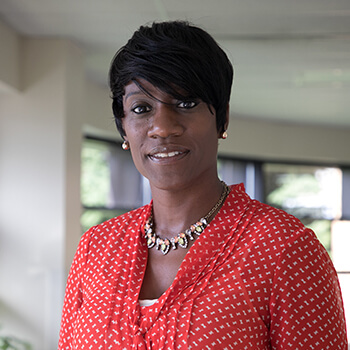
Education
- Ph D - Social Work, Capella University (2003)
- BS - Social Work, Tennessee State University (1998)
- Social Work, University of Kentucky (1999)
Research Interests
- School Based Mental Health Clinics
Teaching Interests
- Mental Health
- Substance Abuse
Sara E. Casali
DSW, MSW, CSW
Director - Field Education & MSW Field Coordinator, Associate Professor
Office: Health Services H 210
Phone: (262) 243-2189
Bio
Dr. Sara Casali is an Associate Professor, Director of Field Education, and MSW Field Coordinator for the Department of Social Work. She has over 25 years of direct social work experience and almost twenty years experience working in child welfare. Dr. Casali completed her Doctorate of Social Work (DSW) from the University of St. Thomas. Her teaching and research interests include Intersectionality, Field Seminar, child welfare, and custody and placement studies for family courts. Dr. Casali is married with twin sons and enjoys cooking, gardening, practicing yoga, and golf.
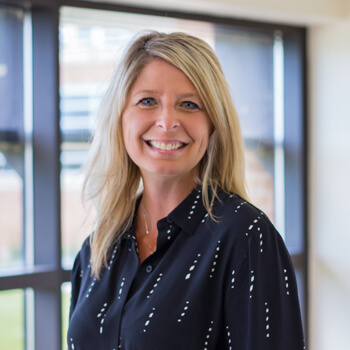
Education
- DSW - Social Work, University of St. Thomas (2022)
- BA - Social Work, Marquette University (1997)
- Masters of Social Work, University Wisconsin-Milwaukee (2001)
Contributions
- Casali, S. (2022). MSW Field Syllabi Analysis: The Crossroads of Intersectionality and Social Work Field Education. In Amy Skeen (Ed.), (Fall 2022 ed.,vol. 12.2,pp. 18). Boston, MA: Field Educator. https://fieldeduc...
Presentations
- Casali, S. (2023). Intersectionality: Why it Should Matter to Social Work Education. Oral Presentation. WCSWE Fall Conference. Wisconsin Dells.
- Casali, S. (2023). Social Location: Why it Should Matter to Social Work Education.. Oral Presentation. Concordia Faculty Seminars. Mequon, WI/Online.
- Casali, S. (2022). Feminist Peer Mentorship in Doctoral Programs: Supporting the Next Generation of Students. Poster. Leading Critical Conversations: Human Rights are Global Rights. Anaheim, CA.
- Casali, S. (2022). Intersectionality and MSW Field Education and Seminar Syllabi: Opportunities for Improvement. Poster. Leading Critical Conversations: Human Rights are Global Rights. Anaheim, CA.
- Casali, S. (2021). Intersectionality: What does it mean for social work education and educators? . Poster. "Leading Critical Conversations: Racial, Economic, & Environmental Justice". Orlando, FL.
Research Interests
- Intersectionality
- Child Custody Studies in Family Court
Teaching Interests
- Intersectionality
- Field Seminar
Sarah Collins
DSW, MSW
Director - MSW Program, Associate Professor
Phone: (262) 243-2191
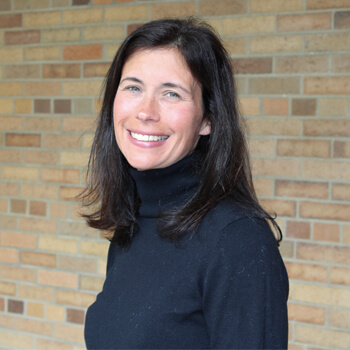
Education
- DSW - Social Work, University of Thomas- St. Catherine's University (2017)
- BA - Psychology, Marquette University (1998)
- Social Work, Dominican University (2007)
Presentations
- Collins, S. (2023). From Global to Local: International Conversations on Social Work. Lecture. Wiscosnin Council on Social Work Education (WICSWE). Wisconsin Deels.
- Collins, S. & Verdegan, R. (2022). Changing Student Perceptions of Professional Stereotypes During an Interprofessional Event. Lecture. Lily Conference. Traverse City, Michigan.
- Collins, S. (2022). A Pandemic-Inspired International Social Work Education Lecture Series. Lecture. Lily Conference. Traverse City, Michigan.
- Collins, S. (2021). Exploring the Impact of Covid-19 on Social Work Students at Concordia . Poster. Faculty Scholarship Week. Mequon/Ann Arbor-Zoom.
- Collins, S. (2019). Interprofessional Education, Collaboration and Practice. Lecture. Crossroads in Social Work. Linz, Austria.
Research Interests
- Human Trafficking, International Interprofessional Education, Interprofessional Education and Practice
Teaching Interests
- Human Trafficking, Interprofessional Education and Practice, International Social Work, Child Welfare, Youth and Technology, Refugee Settlement, Social Welfare Policy
Claire Adeline Haglund
PhD, LMSW, MMT
Assistant Professor
Office: Krieger 105
Phone: (734) 995-7446
Bio
Professor Haglund earned her PhD from the Institute for Clinical Social Work. She also works in the field clinically, focusing on trauma, grief/loss, and chronic illness.
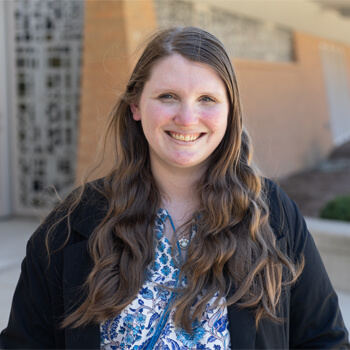
Education
- Ph D - Clinical Social Work , Institute for Clinical Social Work (2023)
- MS - Social Work , Wayne State University (2015)
- BS - Social Work, Music Therapy, Women and Gender Studies , Eastern Michigan University (2014)
Research Interests
- Psychodynamic Theory
- Music Therapy
Teaching Interests
- Research
- Clinical Social Work and Social Justice Intersections
Andrew W. Hayes
MBA, MSSW
Assistant Professor
Office: Heidelberg Hall 210
Phone: (262) 243-2159
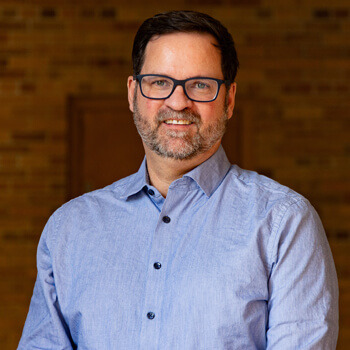
Research Interests
- Resilience and Anti-Fragility
- Aging and Behavioral Health
Teaching Interests
- Social Services Management
- Behavioral Health
Kara K. Kastamo
CCLS
Child Life Program Coordinator, Adjunct Professor
Office: Krieger 115
Phone: (734) 995-7426
Bio
Kara is the Child Life Program Coordinator. She supports the graduate and undergraduate Child Life students while also serving as an adjunct professor at CUAA. Kara worked as a Certified Child Life Specialist at C.S. Mott Children’s Hospital for 10 years. In the last 2.5 years at Mott she provided administrative support to the department. Kara is also a mom to three beautiful children.
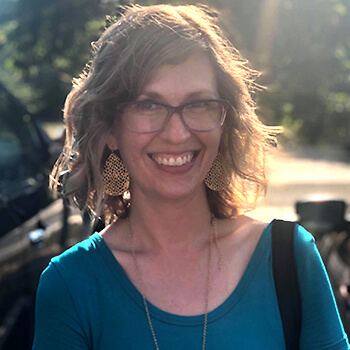
Education
- MS - Organizational Leadership and Healthcare Administration, Concordia University Wisconsin (2019)
- BA - Family Life Education and Child Life, Concordia University Ann Arbor (2009)
Research Interests
- Child Development
- Mental Health
- ACES in children
Teaching Interests
- Trauma informed care
- Bereavement
- Self-care
Nichole Marie Ostrowski
MSW, CAPSW
Director - BSW Program Director, Assistant Professor
Phone: (262) 243-2166
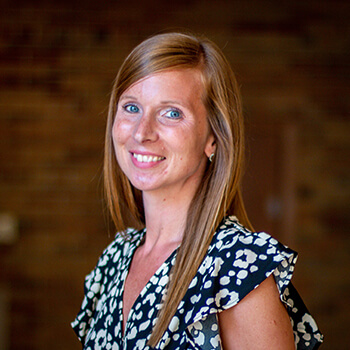
Education
- BA - Sociology, University of Wisconsin-Oshkosh (2002)
- Social Work, University of Wisconsin-Milwaukee (2010)
Research Interests
- Trauma Informed Care
- Child Welfare and Out-of-Home Care
The Council on Social Work Education (CSWE) Commission on Accreditation identifies nine competencies with behaviors as the standard for achievement in social work programs. These behaviors are augmented by advanced behaviors associated with the MSW degree specializations:
- Demonstrate Ethical and Professional Behavior
- Advance Human Rights and Social, Racial, Economic, and Environmental Justice
- Engage Anti-Racism, Diversity, Equity, and Inclusion (ADEI) in Practice
- Engage in Practice-Informed Research and Research-Informed Practice
- Engage in Policy Practice
- Engage with Individuals, Families, Groups, Organizations, and Communities
- Assess Individuals, Families, Groups, Organizations, and Communities
- Intervene with Individuals, Families, Groups, Organizations, and Communities
- Evaluate Practice with Individuals, Families, Groups, Organizations, and Communities
Learn more about competencies, behaviors, and advanced behaviors here.
View a webinar from February 29th here:
- CSWE - Council on Social Work Education
- NASW - National Association of Social Workers
- NASW - Wisconsin Chapter
- NACSW - North American Association of Christians in Social Work
- IFSW - International Federation of Social Workers
- DSPS - Department of Safety and Professional Services
- Social Workers
- AWSB - Association of Social Work Boards
Do I need an undergraduate degree in social work to apply for an MSW?
No. You can have a bachelor’s degree in any discipline.
How long will it take me to get an MSW?
As a full-time regular graduate student, it will take you two years. As a full-time graduate student with Advanced Standing, it will take you one year.
Can I attend part-time?
Yes. We offer part-time options in the regular and Advanced Standing programs. Students in the regular two-year graduate program can complete the program in two, three, or four years. Students with advanced standing can complete the program in two years.
How do the Advanced Standing and regular programs differ?
Advanced Standing students are only required to take the second year (specialization year) of the graduate program. The regular program is 66 credits; the Advanced Standing program is 39 credits.
Why don’t Advanced Standing students take the first year of the graduate program?
Social workers with a BSW from an accredited program already have the profession’s required knowledge base. Students with bachelor’s degrees in other areas of study will obtain that required knowledge base during the first MSW year. Both regular and Advanced Standing students take the same courses offered during the second year of the MSW program, known as the specialization year.
What is the MSW program concentration at CUW?
We offer an Advanced Generalist Specialization—a preferred choice for states with large rural populations. The Advanced Generalist is a well-rounded specialization, offering progressive classes that support all systemic practice levels (micro, mezzo, and macro).
How can I augment my MSW to support my specific practice interest?
Choose from our many electives that will strengthen practice in your specific interest area. Since social workers are lifelong learners, you can continually update your education through workshops, conferences, and other training opportunities.
Do I need a minor?
No. Graduate students do not have minors.
Can I work full-time while I attend the MSW program?
We highly discourage working full-time while you’re a full-time MSW student. Between class, study, and internship demands, it would be extremely stressful and difficult. We recommend full-time students work only 20 hours a week.
Is the program accredited?
We are fully accredited by the Council on Social Work Education (CSWE). What does this mean and why is it important, you ask? Good Question! The CSWE mission is to ensure those attending social work programs will receive high-quality education pertinent to the profession. CUW had to meet rigorous standards and criteria in our programming in order to be in good standing.
What is Advanced Standing and am I eligible?
Advanced Standing is available if you’ve earned a bachelor’s degree in social work from a CSWE-accredited program. Eligible Advanced Standing students must have earned a cumulative GPA of 3.5 in all social work courses, or a 3.0 with one year of experience. Once accepted for Advanced Standing, you must begin your graduate program within seven years of completing your BSW.
If I don’t have a bachelor’s degree in social work, can I still apply for the MSW program?
Yes! You’d apply for the regular two-year MSW program.
I have years of field experience but not a bachelor’s degree in social work—can I apply for the Advanced Standing program?
No. The Council on Social Work Education (CSWE), which accredits all social work programs, stipulates that only applicants who graduate from an accredited BSW program are eligible for Advanced Standing.
May I apply for Advanced Standing if I’ve completed graduate coursework in a social work-related field?
No; Advanced standing is only for applicants with a BSW degree accredited by CSWE.